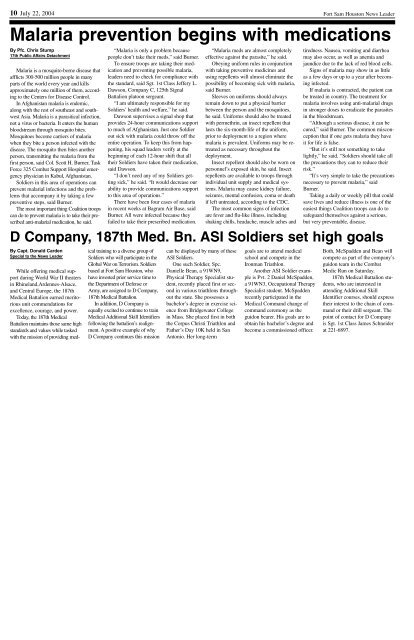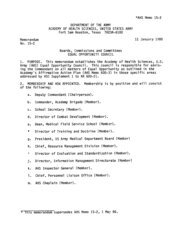Download - Fort Sam Houston - U.S. Army
Download - Fort Sam Houston - U.S. Army
Download - Fort Sam Houston - U.S. Army
Create successful ePaper yourself
Turn your PDF publications into a flip-book with our unique Google optimized e-Paper software.
10 July 22, 2004<br />
By Pfc. Chris Stump<br />
17th Public Affairs Detachment<br />
Malaria is a mosquito-borne disease that<br />
afflicts 300-500 million people in many<br />
parts of the world every year and kills<br />
approximately one million of them, according<br />
to the Centers for Disease Control.<br />
In Afghanistan malaria is endemic,<br />
along with the rest of southeast and southwest<br />
Asia. Malaria is a parasitical infection,<br />
not a virus or bacteria. It enters the human<br />
bloodstream through mosquito bites.<br />
Mosquitoes become carriers of malaria<br />
when they bite a person infected with the<br />
disease. The mosquito then bites another<br />
person, transmitting the malaria from the<br />
first person, said Col. Scott H. Burner, Task<br />
Force 325 Combat Support Hospital emergency<br />
physician in Kabul, Afghanistan.<br />
Soldiers in this area of operations can<br />
prevent malarial infections and the problems<br />
that accompany it by taking a few<br />
preventive steps, said Burner.<br />
The most important thing Coalition troops<br />
can do to prevent malaria is to take their prescribed<br />
anti-malarial medication, he said.<br />
By Capt. Donald Carden<br />
Special to the News Leader<br />
While offering medical support<br />
during World War II theaters<br />
in Rhineland,Ardennes-Alsace,<br />
and Central Europe, the 187th<br />
Medical Battalion earned meritorious<br />
unit commendations for<br />
excellence, courage, and power.<br />
Today, the 187th Medical<br />
Battalion maintains those same high<br />
standards and values while tasked<br />
with the mission of providing med-<br />
“Malaria is only a problem because<br />
people don’t take their meds,” said Burner.<br />
To ensure troops are taking their medication<br />
and preventing possible malaria,<br />
leaders need to check for compliance with<br />
the standard, said Sgt. 1st Class Jeffery L.<br />
Dawson, Company C, 125th Signal<br />
Battalion platoon sergeant.<br />
“I am ultimately responsible for my<br />
Soldiers’ health and welfare,” he said.<br />
Dawson supervises a signal shop that<br />
provides 24-hour communications support<br />
to much of Afghanistan. Just one Soldier<br />
out sick with malaria could throw off the<br />
entire operation. To keep this from happening,<br />
his squad leaders verify at the<br />
beginning of each 12-hour shift that all<br />
their Soldiers have taken their medication,<br />
said Dawson.<br />
“I don’t need any of my Soldiers getting<br />
sick,” he said. “It would decrease our<br />
ability to provide communications support<br />
to this area of operations.”<br />
There have been four cases of malaria<br />
in recent weeks at Bagram Air Base, said<br />
Burner. All were infected because they<br />
failed to take their prescribed medication.<br />
ical training to a diverse group of<br />
Soldiers who will participate in the<br />
Global War on Terrorism. Soldiers<br />
based at <strong>Fort</strong> <strong>Sam</strong> <strong>Houston</strong>, who<br />
have invested prior service time to<br />
the Department of Defense or<br />
<strong>Army</strong>, are assigned to D Company,<br />
187th Medical Battalion.<br />
In addition, D Company is<br />
equally excited to continue to train<br />
Medical Additional Skill Identifiers<br />
following the battalion’s realignment.<br />
A positive example of why<br />
D Company continues this mission<br />
can be displayed by many of these<br />
ASI Soldiers.<br />
One such Soldier, Spc.<br />
Danielle Bean, a 91WN9,<br />
Physical Therapy Specialist student,<br />
recently placed first or second<br />
in various triathlons throughout<br />
the state. She possesses a<br />
bachelor’s degree in exercise science<br />
from Bridgewater College<br />
in Mass. She placed first in both<br />
the Corpus Christi Triathlon and<br />
Father’s Day 10K held in San<br />
Antonio. Her long-term<br />
“Malaria meds are almost completely<br />
effective against the parasite,” he said.<br />
Obeying uniform rules in conjunction<br />
with taking preventive medicines and<br />
using repellents will almost eliminate the<br />
possibility of becoming sick with malaria,<br />
said Burner.<br />
Sleeves on uniforms should always<br />
remain down to put a physical barrier<br />
between the person and the mosquitoes,<br />
he said. Uniforms should also be treated<br />
with permethrin, an insect repellent that<br />
lasts the six-month-life of the uniform,<br />
prior to deployment to a region where<br />
malaria is prevalent. Uniforms may be retreated<br />
as necessary throughout the<br />
deployment.<br />
Insect repellent should also be worn on<br />
personnel’s exposed skin, he said. Insect<br />
repellents are available to troops through<br />
individual unit supply and medical systems.<br />
Malaria may cause kidney failure,<br />
seizures, mental confusion, coma or death<br />
if left untreated, according to the CDC.<br />
The most common signs of infection<br />
are fever and flu-like illness, including<br />
shaking chills, headache, muscle aches and<br />
goals are to attend medical<br />
school and compete in the<br />
Ironman Triathlon.<br />
Another ASI Soldier example<br />
is Pvt. 2 Daniel McSpadden,<br />
a 91WN3, Occupational Therapy<br />
Specialist student. McSpadden<br />
recently participated in the<br />
Medical Command change of<br />
command ceremony as the<br />
guidon bearer. His goals are to<br />
obtain his bachelor’s degree and<br />
become a commissioned officer.<br />
<strong>Fort</strong> <strong>Sam</strong> <strong>Houston</strong> News Leader<br />
Malaria prevention begins with medications<br />
tiredness. Nausea, vomiting and diarrhea<br />
may also occur, as well as anemia and<br />
jaundice due to the lack of red blood cells.<br />
Signs of malaria may show in as little<br />
as a few days or up to a year after becoming<br />
infected.<br />
If malaria is contracted, the patient can<br />
be treated in country. The treatment for<br />
malaria involves using anti-malarial drugs<br />
in stronger doses to eradicate the parasites<br />
in the bloodstream.<br />
“Although a serious disease, it can be<br />
cured,” said Burner. The common misconception<br />
that if one gets malaria they have<br />
it for life is false.<br />
“But it’s still not something to take<br />
lightly,” he said. “Soldiers should take all<br />
the precautions they can to reduce their<br />
risk.”<br />
“It’s very simple to take the precautions<br />
necessary to prevent malaria,” said<br />
Burner.<br />
Taking a daily or weekly pill that could<br />
save lives and reduce illness is one of the<br />
easiest things Coalition troops can do to<br />
safeguard themselves against a serious,<br />
but very preventable, disease.<br />
D Company, 187th Med. Bn. ASI Soldiers set high goals<br />
Both, McSpadden and Bean will<br />
compete as part of the company’s<br />
guidon team in the Combat<br />
Medic Run on Saturday.<br />
187th Medical Battalion students,<br />
who are interested in<br />
attending Additional Skill<br />
Identifier courses, should express<br />
their interest to the chain of command<br />
or their drill sergeant. The<br />
point of contact for D Company<br />
is Sgt. 1st Class James Schneider<br />
at 221-6897.

















